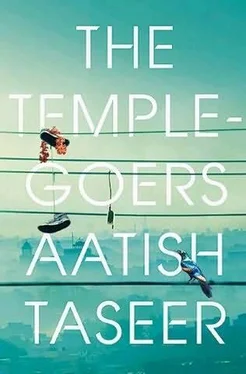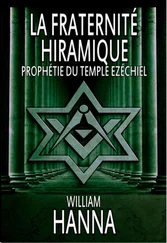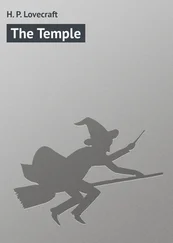Shabby was nodding her head vigorously even before he had finished. She took a chopstick out from her grey bun and began playing with it in her fingers. An arch smile rose to her lips.
‘Ah!’ she said. ‘So you have a communal agenda. I get it now.’
‘Communal?’ the writer said, with genuine confusion in his eyes.
‘ “Communal” in India,’ my mother explained, ‘means advancing the interests of a particular community or religious group; to be divisive.’
The writer chuckled happily.
But then, as if thinking still of what he had said, his thoughts turned inward. I had the feeling he was not quite finished. It had been very affecting to hear him speak, very affecting to watch his distant observations coincide with smaller, more particular observations of my own. I had thought only of Aakash as he spoke and was feeling some relief that the appeal he held for me was not mere obsession, that there was something more abstract, more general, behind it. But it was an unstable feeling, edging on euphoria and hysteria, and what the writer said next broke my composure.
‘You know,’ he began, looking deeply into the room, where illuminated foliage could be seen beyond darkened windows and the orange coils of an electric heater burned steadily, ‘they say that Benares is a microcosm of India. Today, most people take that to mean that it contains all the horror and filth of India, and also, loath as I am to use these words, the charm, the beauty, the magic, whatever you want to call it. But Benares was once a very different kind of microcosm; it was a very self-conscious microcosm. The streams that watered the groves in its Forest of Bliss were named after all the rivers of India, not unlike the avenues in Washington, DC, being named after the American states. All the princes from around the country had their palaces along the river. And they would come and retire there after they had forsaken the cares of the world. The Indian holy points, the places of the larger pilgrimage, were all represented symbolically in Benares. It was said you could do the whole pilgrimage in miniature in Kashi. And Kashi, too, was recreated symbolically across the country. It wasn’t a microcosm; it was a kind of cosmic capital.
‘And on certain days the moon would appear in the afternoon and the water from those symbolic Indian rivers would run through the groves and flood the Ganga, which, at one point, curls around the city. The ancient Hindus, with their special feeling for these cosmic changes, would gather at high points in the city to watch, like people seeing a fireworks display. Now consider this: it is mid-afternoon, the sun is out, but probably obscured by clouds, appearing now and then like a silver disc, the moon is low over the river and there is a kind of daytime darkness. The sound of water can be heard in the silence. It is the sound of streams gushing through the Forest of Bliss and emptying into the Ganga. And then suddenly, at the exact point where the river bends, the Ganga, flowing smoothly in one direction, stops and begins, as if part of the magic of that darkened afternoon, to flow in the opposite direction. That was how people, common people,’ he added pointedly, ‘were brought in touch with the wholeness of the place, in just the same way as someone crossing a street in Manhattan might feel when, looking to one side and seeing the sweep of the avenue, he says, “I’m in New York!” It’s my dream to see that wholeness restored in India.’
There was an interruption from an unexpected quarter. ‘This thing you describe,’ Shabby’s husband asked urgently, receiving a dirty look from his wife, ‘can one still see it in Benares?’
‘No. What is there to see now?’ the writer replied sadly. ‘No one has seen it since the thirteenth century, since… They destroyed it six times, you know, the invaders. Six times, over hundreds of years, they smashed its temples and carried away its stones until they had broken its orientation. The river no longer performed its tricks, the Forest of Bliss was bricked over, its pools and ponds drained, and the lingas, once placed ingeniously across the island city, uprooted. I think they even tried to call it Muhammadabad.’
The writer’s descriptions had perturbed everyone at the table; Chamunda had tears in her eyes. ‘No one knows any of this. No, Udaya?’ She reached past the writer and held my mother’s hand. ‘That’s our problem in India, no one knows any of these things.’
Shabby had also fallen silent and played thoughtfully with a large silver ring on her finger.
‘Chalo,’ my mother said suddenly, alarmed perhaps at the mood that had descended over her dinner party, ‘let’s sit soft.’
I had meant to keep many things to myself, but the vision of completeness that the writer’s descriptions had inspired, as well as a thought about the city beyond, smouldering from some of the tensions that had arisen that evening, forced me to ask, ‘How do Indians who aren’t “temple-going” participate in this Indian idea?’ I was thinking in part of myself, but also of non-Hindus, men like Zafar, whom I had arranged to see in the old city some time over the next few days. He had had his operation while I was away and was still convalescing.
The writer, perhaps thinking I was being political, coldly dismissed me. ‘It’s more difficult for them,’ he said. ‘If you mean Muslims, perhaps they should begin by thinking of themselves as converts to Islam and not invest themselves so emotionally with the invader. If you mean the green-card folk…’
It was too much for me. I burst out with the story of Aakash. I spoke in disjointed sentences of this Brahmin trainer I had become friends with, and how he was many men to many people, now a trainer, excited about brands and malls, now a Brahmin, performing the ancient rites of his caste. I spoke of his hunger, his ambition, of the disappearance of his ancestor down a river and how he had taken me to see the place where he had lived. I told them of my discovery in the National Museum, and how I had seen first hand, but cast in a magical way, the history of the nineteenth-century anti-Brahmin movement that the writer had spoken of. And in my excitement, I also let slip the story of Aakash’s affair with an industrialist’s ‘healthy’ daughter who that very afternoon had been whisked away so that she might make a better match. And of Kris, her creative-writer brother, who was determined to break her love for Aakash. I said that I understood her love for him very well, understood how she might want to take a chance on him, how she might have come to believe in his star. I said all this, without thinking of the consequences, without thinking of who might be listening, and there was some agitation in my voice. The writer listened enthralled; he seemed to see that I was trying to get something off my chest. And when I had finished, when I had told him how Delhi for Aakash was a city with temples to Saturn, how the weeks now for him were jam-packed with religious observances, fasts, shopping for new kitchen vessels, a great jagran that he and his friends had put together in their colony…
‘A jagran?’ the writer asked.
‘It’s a kind of wake,’ I said. ‘I’ve never been to one, but people sit up all night listening to religious stories, watching pageants, singing devotional songs, I don’t know.’
When I had said all this, the writer stopped me, and with great sympathy in his voice, asked, ‘Do you envy him? Do you envy this trainer?’
‘Envy?’ I laughed.
The whole room – my mother, my girlfriend, Chamunda and Shabby – was watching me.
‘Do you envy how simple it will be for him?’
The writer had seen with an astrologer’s vision to my depths; to lie now would have been an act of self-destruction too great. ‘Yes,’ I said bitterly. ‘I envy that terribly. I envy the fact that when the world becomes his, which it will have to, or none of what we’re saying has any meaning, he will be able to put his hand straight in the fire, with his language, his religion, his idea of who he is, intact and close around him. And people like me, who never played any part in rejecting these things, who inherited this rejection from the generations before us, will have no place in that world. What I feel when I see him is something like a nostalgia for a childhood I never lived. But it’s not really childhood I’m craving; I didn’t realize that until now. It’s the cultural wholeness you spoke earlier of, the security of which I have, in my mind, substituted with the security of childhood.’
Читать дальше












